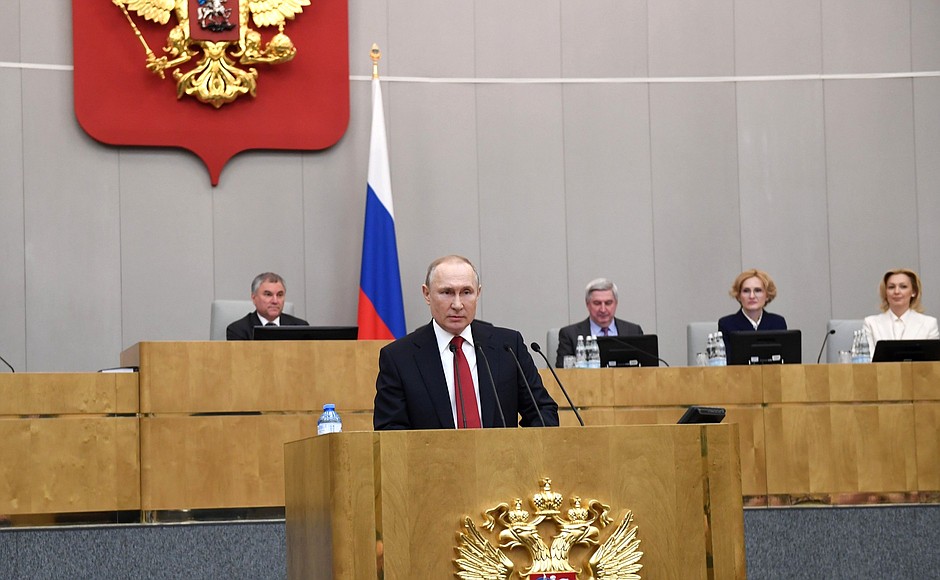 Image source: President of Russia
Image source: President of Russia
Putin, Russia’s Forever President
On Tuesday, Russia’s State Duma approved a constitutional amendment that resets presidential term limits, allowing current President Vladimir Putin to run for office again in 2024. This new law effectively secures Putin’s position until 2036. In a televised speech, Putin stated: “when a country is going through such upheavals and such difficulties (in our case we have not yet overcome all the problems since the USSR, this is also clear), stability may be more important and must be given priority.” This constitutional change will be included in a national referendum on April 22nd. According to a Levada-Carnegie poll, 59% of Russians think the country needs “decisive comprehensive change.” Will Putin’s continued rule deliver on the change Russians want?
Constitutional Changes Detailed
Members of Russia’s State Duma shared a list of possible constitutional amendments on March 2nd. More than two-hundred proposed amendments have been received by the amendment working group. Vedomosti published some of the amendments that will be included in the referendum:
- The institution of family and marriage is under the jurisdiction of the State. Marriage is defined as a union between a man and a woman.
- The Russian Federation is the successor to the U.S.S.R. This amendment details “historical continuity” of the Russian Federation and refers to “the memory of the ancestors who transmitted to us ideals and faith in God.”
- Russian is the “language of the state-forming people.” Russian speakers have equal rights to other people living in Russia. These people also have the right to preserve their native language.
- Alienation and any actions aimed at alienation of Russian territories is prohibited.
- Minimum wage is adjusted to never be lower than the cost of living.
- Presidential requirement to be a permanent resident of Russia rises from 10 to 25 years.
Russian People’s Appetite for Change
Russia’s approaching constitutional referendum has drawn attention to the reaction of the Russian public. After the amendments are signed by President Putin, nationwide voting (not accounting for fraud) will determine the fate of the proposed changes. Though the strength of the opposition in Russia isn’t particularly great, sentiments can be gleaned by the discussions circulating:
- Some opposition leaders do not think the constitution should be defended or preserved it its current form. Aleksei Navalny, a prominent opposition leader, said on Twitter that “Russia’s constitution is loathsome, it should not be defended.” Navalny wrote that it is necessary to protest Putin and his associates but does not think constitutional changes are the correct issue to coalesce around.
- Opposition politician Ilya Yashin urged the Russian people to protest the amendments, saying “Putin should not rule forever. It’s time to remind him of that”
- According to independent polls, 27% of Russians want Putin to remain president after 2024. The same poll shows that 25% of people want Putin to become a “private citizen.” While this number isn’t high, it does show that opposition exists.
It’s clear by the presence of an opposition movement, that some Russians want political change – but overall opinions are not uniform, and protests have not meaningfully changed government action. 22,000 people gathered in Moscow on February 29th to protest the constitutional amendments, but this opposition was not strong enough to illicit major government reaction.
According to the Carnegie Moscow Center, Russians believe the government needs to focus on fixing socioeconomic issues, such as improving the standard of living and increasing pensions and wages. It is likely that the inclusion of an adjusted minimum wage will placate the masses and keep people from mobilizing large scale opposition to Putin’s continued rule.
The U.S. Needs a Long Game
As long as the government meets the basic needs of the Russian people, like collecting trash, Putin will be in power for the long haul. The United States needs to develop a plan to effectively approach the U.S.-Russia relationship and secure its long-term interests with President Putin in power. While Russian actions have elevated the country to more of a full adversary, the U.S. is rapidly running out of room to prevent the return of Cold War era tensions. It is crucial to strengthen people-to-people ties and completely readjust messaging around U.S.-Russia relations in order to better secure America’s interests versus a Putin in perpetual power. To win the long game, the U.S. needs to use long-term tools.





